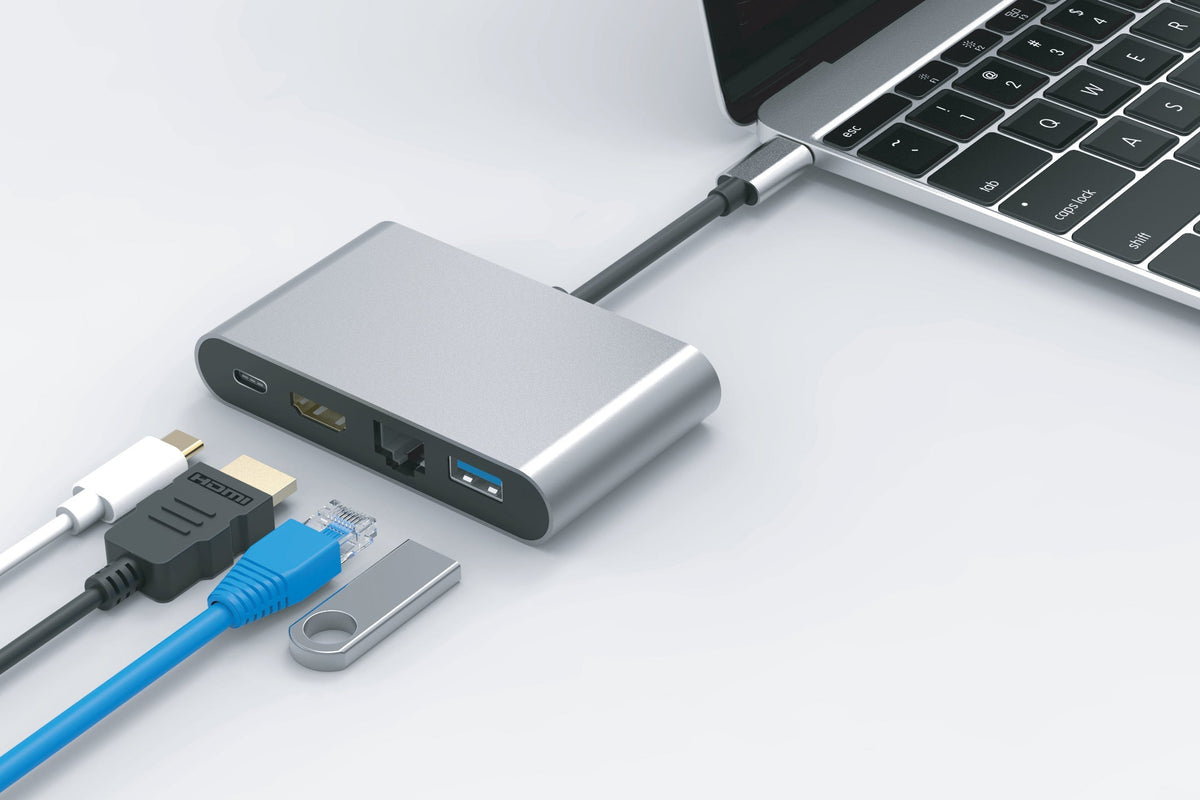
Why use a USB hub?
|
|
Time to read 4 min
|
|
Time to read 4 min
Whether you’re using a laptop with limited ports or you need to connect a device but don’t have the right connection available, USB hubs can solve all your problems! Available in both USB-A and USB-C varieties, USB hubs often feature multiple connectivity options, but which one is right for you? Maplin are here to help you!
Table of content
Sure, you’ve connected your USB hub, but now you’ve lost access to the USB port itself, right? Wrong! Most USB hubs include other USB-A and/or USB-C ports, so you’ll still be able to connect devices such as mice, keyboards and charging cables.
USB-A ports are typically found on both USB hubs and computers, allowing for seamless connectivity between devices. They are capable of delivering power and data transfer simultaneously, making them essential for charging devices and transferring files. Despite their ubiquity, USB-A ports are gradually being replaced by newer USB standards such as USB-C, which offer enhanced capabilities and features.
One of the key advantages of USB-C ports is their versatility and versatility. USB-C supports high-speed data transfer, video output (via DisplayPort or HDMI), and power delivery, making it an all-in-one solution for connectivity. With USB-C hubs, users can connect multiple peripherals and accessories to their devices with a single cable, simplifying cable management and maximizing productivity.
If you want to create a multi-monitor setup, a USB hub can be a handy solution. They often feature some combination of HDMI, DisplayPort and VGA connectivity, so you can work and play across multiple monitors at the same time.
With HDMI ports on USB hubs, users can extend their display setup and create a multi-monitor workstation for enhanced productivity and multitasking. HDMI ports are essential for professionals working in creative industries such as graphic design, video editing, and animation, where accurate colour reproduction and high-resolution visuals are paramount.
Need a more stable internet connection? Some USB hubs include a Gigabit RJ45 port, also known as an Ethernet port. This makes it possible to connect directly to a router or powerline adapter, so you won’t struggle with any intermittent or sluggish WiFi issues.
Ethernet ports, also known as LAN (Local Area Network) ports, enable wired internet connectivity on USB hubs. These ports allow users to connect their computers, laptops, or gaming consoles to a wired network for faster and more reliable internet access. Ethernet ports are essential for scenarios where Wi-Fi connectivity is unreliable or unavailable, such as in crowded environments or areas with poor signal strength.
USB hubs equipped with Ethernet ports offer users the flexibility to connect to wired networks without sacrificing the convenience of USB connectivity. These ports are particularly useful for professionals working in IT, networking, and cybersecurity, as well as gamers seeking low-latency, high-speed internet connections for online gaming.
As we move towards wireless audio, many devices are missing the traditional 3.5mm audio jack entirely. So how do you connect your favourite wired headphones to listen to music or get involved in work meetings? Many USB hubs include a 3.5mm jack, so you won’t have to splash out on a new pair of wireless headphones.
If you’re a photographer, you’ll know how important it is to review and edit photos on a computer to get the best results. Pick up a USB hub with a built-in SD card reader and you’ll be sharing your creations with friends and family in no time.
USB hubs are remarkably compact and portable, making them ideal companions for users on the move. Whether you're travelling for work, commuting to school, or working remotely from a coffee shop, USB hubs make it simple to connect all of the devices you need to your laptop.
Portable USB hubs are lightweight and easy to carry, allowing users to connect peripherals and accessories wherever they go. Whether you're connecting to a projector for a presentation, accessing files from an external hard drive, or charging a smartphone or tablet, USB hubs provide essential connectivity options in a compact and portable package.
USB hubs are versatile and indispensable accessories for modern-day users, offering a wide range of benefits from simplified cable management to expanded connectivity options. Whether in need of additional ports for connecting peripherals or seeking to maximize productivity and efficiency, USB hubs provide convenient solutions for users across various domains. With their compact size, affordability, and portability, USB hubs are essential tools for managing the complexities of our interconnected world.
Explore our full USB Hub range and find the ideal model to suit your needs! Looking for cables to connect your devices? Check out our full range of Cables and Adapters.
USB Connectivity: USB hubs offer additional USB-A and/or USB-C ports, ensuring connectivity for devices like mice, keyboards, and charging cables alongside the hub
Multi-Monitor Setup: USB hubs with HDMI ports facilitate multi-monitor setups, enhancing productivity, and visual clarity, particularly beneficial for creative professionals
Ethernet Connectivity: USB hubs with Ethernet ports provide stable wired internet connections, crucial for scenarios where Wi-Fi is unreliable or unavailable
Additional Features: Some USB hubs include 3.5mm audio jacks for wired headphone connectivity, SD card readers for photographers, and a portable design for convenience on the go
An avid gamer from a young age, Jon has dabbled in gaming journalism and dedicates much of his spare time to this hobby. He also has an interest in music, playing bass guitar in a rock covers band.
Having previously worked as a copywriter with another electronics retailer, he was eager to join Maplin with their new online venture. In addition to writing blogs, Jon also works on many of the website's landing pages and adding new tech to the range.
